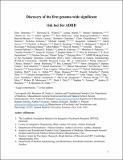Discovery of the first genome-wide significant risk loci for attention deficit/hyperactivity disorder
Abstract
Attention deficit/hyperactivity disorder (ADHD) is a highly heritable childhood behavioral disorder affecting 5% of children and 2.5% of adults. Common genetic variants contribute substantially to ADHD susceptibility, but no variants have been robustly associated with ADHD. We report a genome-wide association meta-analysis of 20,183 individuals diagnosed with ADHD and 35,191 controls that identifies variants surpassing genome-wide significance in 12 independent loci, finding important new information about the underlying biology of ADHD. Associations are enriched in evolutionarily constrained genomic regions and loss-of-function intolerant genes and around brain-expressed regulatory marks. Analyses of three replication studies: a cohort of individuals diagnosed with ADHD, a self-reported ADHD sample and a meta-analysis of quantitative measures of ADHD symptoms in the population, support these findings while highlighting study-specific differences on genetic overlap with educational attainment. Strong concordance with GWAS of quantitative population measures of ADHD symptoms supports that clinical diagnosis of ADHD is an extreme expression of continuous heritable traits.
Citation
ADHD Working Group of the Psychiatric Genomics Consortium (PGC) , Early Lifecourse & Genetic Epidemiology (EAGLE) Consortium , 23andMe Research Team & Kent , L 2019 , ' Discovery of the first genome-wide significant risk loci for attention deficit/hyperactivity disorder ' , Nature Genetics , vol. 51 , no. 1 , pp. 63-75 . https://doi.org/10.1038/s41588-018-0269-7
Publication
Nature Genetics
Status
Peer reviewed
ISSN
1061-4036Type
Journal article
Collections
Items in the St Andrews Research Repository are protected by copyright, with all rights reserved, unless otherwise indicated.
Related items
Showing items related by title, author, creator and subject.
-
Next-gen sequencing identifies non-coding variation disrupting miRNA-binding sites in neurological disorders
Devanna, P; Chen, X S; Ho, J; Gajewski, D; Smith, S D; Gialluisi, A; Francks, C; Fisher, S E; Newbury, D F; Vernes, S C (2018-05) - Journal articleUnderstanding the genetic factors underlying neurodevelopmental and neuropsychiatric disorders is a major challenge given their prevalence and potential severity for quality of life. While large-scale genomic screens have ... -
Giardia secretome highlights secreted tenascins as a key component of pathogenesis
Dubourg, Audrey; Xia, Dong; Winpenny, John P; Al Naimi, Suha; Bouzid, Maha; Sexton, Darren W; Wastling, Jonathan M; Hunter, Paul R; Tyler, Kevin M (2018-03) - Journal articleBackground: Giardia is a protozoan parasite of public health relevance that causes gastroenteritis in a wide range of hosts. Two genetically distinct lineages (assemblages A and B) are responsible for the human disease. ... -
Six reference-quality genomes reveal evolution of bat adaptations
Jebb, David; Huang, Zixia; Pippel, Martin; Hughes, Graham M; Lavrichenko, Ksenia; Devanna, Paolo; Winkler, Sylke; Jermiin, Lars S; Skirmuntt, Emilia C; Katzourakis, Aris; Burkitt-Gray, Lucy; Ray, David A; Sullivan, Kevin A M; Roscito, Juliana G; Kirilenko, Bogdan M; Dávalos, Liliana M; Corthals, Angelique P; Power, Megan L; Jones, Gareth; Ransome, Roger D; Dechmann, Dina K N; Locatelli, Andrea G; Puechmaille, Sébastien J; Fedrigo, Olivier; Jarvis, Erich D; Hiller, Michael; Vernes, Sonja C; Myers, Eugene W; Teeling, Emma C (2020-07-23) - Journal articleBats possess extraordinary adaptations, including flight, echolocation, extreme longevity and unique immunity. High-quality genomes are crucial for understanding the molecular basis and evolution of these traits. Here we ...

